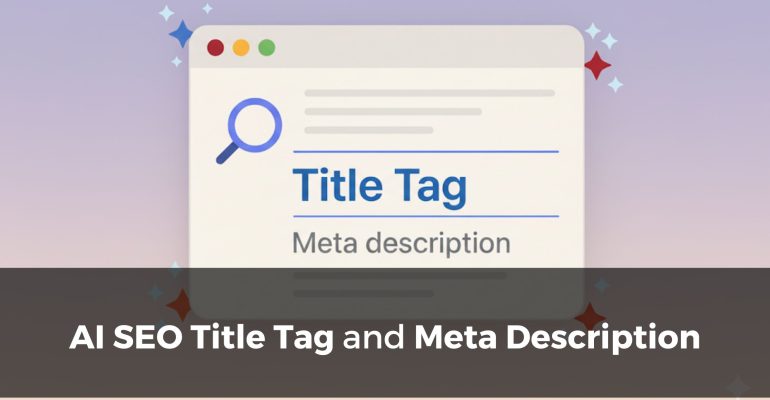Why SEO Title Tags and Meta Descriptions Still Matter in the AI Era
When you search for “digital marketing courses in Dubai” or “AI training in UAE,” the first thing you see is the blue clickable link (title tag) and a short snippet of text below it — the meta description. These small but powerful elements can determine whether someone clicks on your result or scrolls past.
In the AI era, with search engines evolving into answer engines and generative AI models surfacing content directly, some believe title tags and meta descriptions have lost importance. But the truth is: they matter more than ever. According to Search Engine Land, well-optimized titles and descriptions remain critical for click-through rates, brand trust, and AI-driven search results.
Why Title Tags Still Matter
Title tags are not just for SEO; they’re your first impression in search. They also appear in AI-powered results where the link reference is shown. A strong title:
- Should be around 60 characters (to avoid truncation).
- Put service/product name first — e.g., “AI Courses in Dubai – Beginner-Friendly Training”.
- Add location if relevant — helps for local SEO and geo-specific searches.
- Include service category — e.g., “digital marketing,” “AI training,” “SEO workshops.”
- Brand name last — since people searching your brand already know it.
This structure aligns with recommendations from both SEO practitioners and tools like Yoast, ensuring your titles are keyword-rich yet user-focused.
Crafting Meta Descriptions in the AI Era
Meta descriptions provide up to 155–160 characters of space to explain what your page offers. While Google sometimes rewrites them, writing your own still improves consistency and relevance.
Best practices include:
- Expand on the title with meaningful context.
- Blend service, location, and value proposition naturally.
- Add a call-to-action (CTA) such as “Learn more,” “Join today,” or “Book your course.”
- Keep them reader-first — don’t just stuff keywords.
👉 According to HubSpot, even as AI shapes how people find answers, compelling snippets remain essential for driving clicks.
Examples of Optimized Titles and Meta Descriptions
- Page: AI Courses in Dubai
- Title: AI Courses in Dubai – Beginner-Friendly Training | SEO International
- Meta Description: Join live AI courses in Dubai on Google Meet. Learn AI tools, automation, and practical skills to advance your career. Enroll at seointl.net today.
- Page: Digital Marketing Training UAE
- Title: Digital Marketing Training UAE – Live Online Courses | SEO International
- Meta Description: Get hands-on digital marketing training in the UAE. Learn SEO, social media, and Google Ads with beginner-friendly live classes on Google Meet.
- Blog Post: SEO Basics
- Title: Why Title Tags and Meta Descriptions Still Matter in the AI Era | SEO/AI
- Meta Description: It is okay, if you just leave this blank. Google will automatically choose any relevant piece of your blog post content to be displayed here.
- Page: AI & Digital Marketing Workshops
- Title: AI and Digital Marketing Workshops Dubai – Corporate Training | SEO International
- Meta Description: Upskill your team with AI and digital marketing workshops in Dubai. Interactive corporate training delivered live on Google Meet.
These examples follow the service → location → category → brand structure you suggested. They also highlight benefits and include natural CTAs, making them attractive for both search engines and users.
Meta Keywords Are Dead — Focus on Topics Instead
Some still ask about “meta keywords.” Google officially stopped using them in 2009. Instead, search engines (and AI models) prioritize topics, context, and user intent.
So, instead of forcing keywords, blend them naturally across your:
- Title tags
- Meta descriptions
- Page content
Think of it as writing for humans first, search engines second.
Scaling Titles & Descriptions with AI Tools
One challenge for large websites is writing unique tags for hundreds of pages. This is where AI shines. Tools like ChatGPT or Gemini, or even a custom GPT, can generate optimized titles and meta descriptions if you provide:
- Your page link or context
- Desired structure (service + location + category + brand)
- Character limits
Yoast’s guide shows how AI can assist without replacing human oversight. The key is to review outputs for accuracy, tone, and brand consistency.
Practical Tips & Insights
- Test variations — A/B test titles to see which gets more clicks.
- Avoid clickbait — misleading titles hurt trust and SEO in the long run.
- Write for AI assistants too — clear, well-structured tags are easier for generative AI to surface.
- Localize — for Dubai businesses, always include “Dubai” in your titles for geo-relevance.
👉 Insight: According to Search Engine Land, pages with unique meta descriptions see significantly higher CTRs compared to those relying on auto-generated snippets.
Did You Know?
A study cited by HubSpot found that 64% of clicks in search results go to listings with optimized titles and descriptions — proving their direct impact on traffic, even in an AI-driven search world.
Next Steps: Optimize Your Titles & Descriptions with AI and Training
In the AI era, title tags and meta descriptions are no longer optional — they’re your digital storefront. Whether you’re a freelancer in Dubai, a marketer in Riyadh, or a global entrepreneur, crafting them strategically boosts visibility, traffic, and trust.
- Our AI Courses show how to use AI to streamline SEO tasks like writing meta descriptions.
- Our Marketing Courses teach beginner-friendly SEO strategies, including hands-on work with title tags.
- All classes are delivered live on Google Meet, accessible globally.
Start optimizing smarter — explore our courses and future-proof your SEO today.



